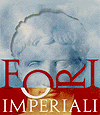Rome and
Christianity
Roman worship was connected to membership in the
community: the citizen participated in worship of the state ( the "triade
capitolina" Jupiter, Juno, Minerva), the soldier in the worship of his body, and the
individual in the worship of his family. There were also an ensemble of ceremonies,
divinities, and rules that were celebrated by public officials and priests on festive
occasions. The right to worship was a part of civil rights, with freedom to profess.
Intervention only occurred in the cases of excessive superstition, belief in wizards or
fortune tellers, or mutilation ceremonies (as in the case of Jewish circumcision).
Particularly strong was the worship of the dead, with burial ceremonies and intercession
celebrations held for the pater familias
Roman power was tolerant toward religion, with
the exception of cases that resulted in riots, like in 70 B.C. when the Jewish rebelled in
Judaea against the rule of Rome after one of their temples was destroyed. The Jewish
population was deprived in a large part of the Holy Land. The consequences were various,
with the "Zealots" (those with weapons in hand, ready to combat against the
"evil" Roman kingdom) and the "Essenes", lead by Jesus of the Nazareth
and John the Baptist. Given the unstable political determination for a new religion, Rome
became more violent, condemning to death those responsible- as in the case of Jesus of the
Nazareth. This event initiated the birth of Christianity.
Christianity criticized paganism which was the
only official religion until then. Many powerful Romans, pagans themselves, unjustly
blamed the Christians for unfortunate events that occurred, such as epidemics, natural
catastrophes, or fires (famous was the persecution of Nero who was let off suspicion as
the arsonist of Rome by accusing the Christians).
Successively, the power tried to control the new religion without repressive or
persecutory methods.
In the III century, when Christianity increased
its power by gathering believers among the powerful, the "pax romana" favored
the expansion of the religion. After a long period of persecution and illegalities,
Constantine with the edict in Milan (313 A.D.) gave official recognition of the Christian
religion. This began an expansion through doctrinal groups toward the attempt to enforce
one doctrine only.
Rome is still the principal seat of Christianity:
The Vatican is the State inside the city with today's believers exceeding 1 billion
worldwide.
> From village to
metropolis: a brief history of Rome.
> Rome Caput Mundi:
chronological table of historical events and map of the Empire
> Panem and Circenses:
entertainment, fundamental element for politics
> Index of the
Emperors
In the other chapters you can find: news
bulletins on archeological excavation advancements made in the in the Imperial Forum zone;
WebView in direct contact with the Forums; the reconstruction of antique buildings;
sayings and characteristics of the Antique Romans. Select the chapter from the four titles
in the black column on the right.
|



